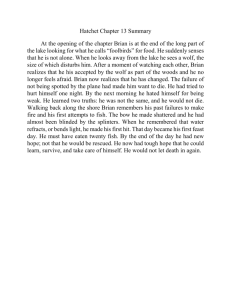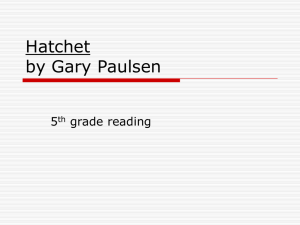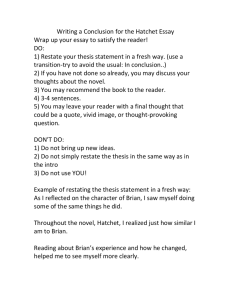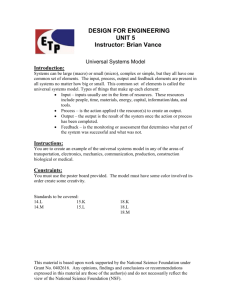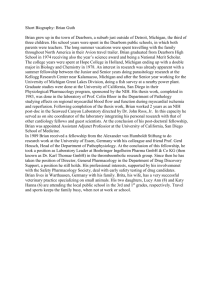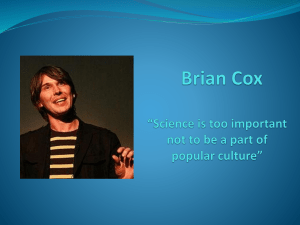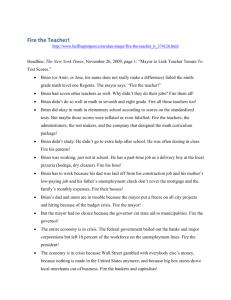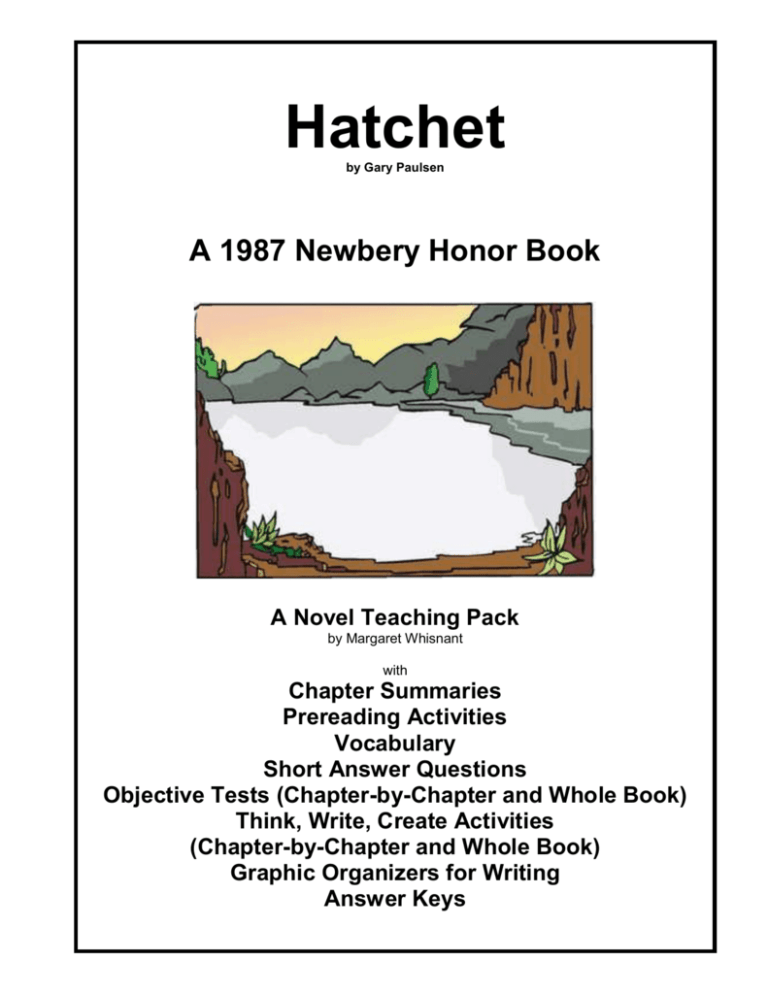
Hatchet
by Gary Paulsen
A 1987 Newbery Honor Book
A Novel Teaching Pack
by Margaret Whisnant
with
Chapter Summaries
Prereading Activities
Vocabulary
Short Answer Questions
Objective Tests (Chapter-by-Chapter and Whole Book)
Think, Write, Create Activities
(Chapter-by-Chapter and Whole Book)
Graphic Organizers for Writing
Answer Keys
Copyright © 2006 Margaret Whisnant
Hatchet
by Gary Paulsen
A Novel Teaching Pack
by Margaret Whisnant
Registered September, 2006
United States Copyright Office
TXu1-313-275
All Rights Reserved by Author
Permission to copy for classroom use only.
ISBN 978-1-934538-04-3
Taking Grades Publishing Company
1110 4th St. Dr., S.E.
Conover, NC 28613
www.takinggrades.com
Table of Contents
Pages
Chapter Summaries . . . . . . . . . . . . . . . . . . . . . . . . . . . . . . . . . . . . . . . . . . . . . . . . 1-6
Before You Read . . . . . . . . . . . . . . . . . . . . . . . . . . . . . . . . . . . . . . . . . . . . . . . . . . . 7-8
Vocabulary
Word List with Definitions. . . . . . . . . . . . . . . . . . . . . . . . . . . . . . . . . . . . . . . . . . . . 9-10
Synonym Search . . . . . . . . . . . . . . . . . . . . . . . . . . . . . . . . . . . . . . . . . . . . . . . . . 11-12
Dictionary Hunt . . . . . . . . . . . . . . . . . . . . . . . . . . . . . . . . . . . . . . . . . . . . . . . . . . . 13-14
How Words Survive . . . . . . . . . . . . . . . . . . . . . . . . . . . . . . . . . . . . . . . . . . . . . . . . . . 15
Reading Assessment
Short Answer . . . . . . . . . . . . . . . . . . . . . . . . . . . . . . . . . . . . . . . . . . . . . . . . . . . . 16-19
Objective Tests . . . . . . . . . . . . . . . . . . . . . . . . . . . . . . . . . . . . . . . . . . . . . . . . . . 20-42
Think, Write, Create
Chapter Activities . . . . . . . . . . . . . . . . . . . . . . . . . . . . . . . . . . . . . . . . . . . . . . . . 43-48
Whole Book Activities . . . . . . . . . . . . . . . . . . . . . . . . . . . . . . . . . . . . . . . . . . . . 49-52
Graphic Organizers . . . . . . . . . . . . . . . . . . . . . . . . . . . . . . . . . . . . . . . . . . . . . . 53-62
Keys . . . . . . . . . . . . . . . . . . . . . . . . . . . . . . . . . . . . . . . . . .. . . . . . . . . . . . . . . . . . 63-68
Copyright © 2006 Margaret Whisnant
3
Chapter Summaries
Hatchet
By Gary Paulsen
Chapter Summaries
Chapter 1
Because of his parents’ divorce, thirteen-year-old Brian Robeson finds himself boarding a
single engine Cessna 406 for the oil fields of northern Canada where he plans to spend the
summer with his father, a mechanical engineer.
A bitter Brian knows a secret and blames his mother for the divorce.
During the silent trip from New York to Hampton, Brian’s mother gives him a hatchet, which he
is wearing on his belt when he boards the bushplane.
In the air, the pilot allows Brian to take control of the plane for a quick flying lesson.
Into the flight the pilot has a massive heart attack, causing the plane to veer to the side and fly
off course.
Brian is alone, without a pilot, flying seven thousand feet in the air above the Canadian
wilderness.
Chapter 2
The pilot is dead, and Brian tries to help himself by flying the plane but manages only to pull the
nose up and push it down.
Brian doesn’t know his location or the meanings of the dials in the cockpit.
Brian manages to make contact using the plane’s transmitter, but the signal is weak and soon
lost.
Brian thinks about his choices of waiting for the plane to run out of gas or pushing the throttle to
make the plane go faster and crash sooner. He decides to keep the plane going where at least
he is safe.
Not only does Brian not know his original course, he has no idea how much the plane has gone
off course.
Mentally Brian practices his plan for bringing the plane down when it runs out of gas by slowing
it and landing in a lake.
As Brian is trying to make contact by radio, the plane runs out of gas.
Chapter 3
A series of errors causes the plane to drop too quickly so that it crashes through trees before it
slams into a lake.
Brian frees himself from the submerging plane and pulls himself out through the shattered front
window.
A screaming Brian struggles through the water to shore.
Chapter 4
In Brian’s memory is the secret of seeing his mother with a man in a strange station wagon.
Brian remains on the shore halfway in the lake for most of the day until he crawls away from
the water and sleeps.
Awake before dawn, Brian is bruised and in pain but grateful to be alive.
With the rising sun, Brian is attacked by swarms of mosquitos that clog his nostrils, pour into
his mouth, and cause his eyes to swell shut. They leave when the sun is fully up.
Brian sees that he is at the base of an L-shaped lake surrounded by small hills with
evergreens, some leafy trees, small brush, and thick grass. A rocky ridge sticks out over the
lake.
The lake contains fish and a beaver dam.
At first Brian thinks his new surroundings are silent, but then he begins to hear the noises of the
wilderness.
Drained of energy, Brian leans against a tall pine and sleeps.
Copyright © 2006 Margaret Whisnant
1
Vocabulary
Word List/Definitions
Hatchet
By Gary Paulsen
Vocabulary List with Definitions
(Arranged According to Story Order)
drone A continuous low dull humming sound (p.2)
lashed Secured or bound, as with a rope, cord, or chain; struck a blow as if with a whip; made a
caustic verbal attack; thrashed (p. 7)
grimacing Making a sharp contortion of the face as in expressing pain, contempt, or disgust
(p. 10)
audible Heard or able to be heard (p. 10)
rigid Stiff; not flexible, not moving; strictly maintained (p. 11)
massive Affecting a large area of bodily tissue; huge; on a large scale (p. 12)
turbulence Instability in the atmosphere; a state of violent disturbance and disorder (p. 14)
ultimately At last; in the end; eventually (p. 14)
intervals The amount of time between two specified instances, events, or stages (p. 24)
visualize To form a mental image of (p. 24)
remnants A surviving trace; something left over; a remainder (p. 36)
abating Reducing in amount, degree, or intensity; decreasing (p. 38)
viciously Severely or intensely; fiercely; in an evil or savage manner (p. 43)
murky Cloudy; lacking clarity; dark, dim or gloomy (p. 45)
frantic Highly excited with strong emotion or frustration; frenzied (p. 47)
extensive Large in spatial extent or range, or amount (p. 47)
amphibious Able to operate both on land and in water (p. 48)
intense Extreme in degree, strength, or size (p. 51)
diminish To make smaller or less or cause to appear so (p. 57)
pulverized Pounded, crushed, or ground into fine particles. (p. 58)
lush Having or characterized by luxuriant vegetation; abundant; plentiful (p. 62)
tart Having a sharp pungent taste; sour; a pastry shell with shallow sides, no crust, and various
fillings (p. 64)
ruefully Done in such a way as to cause, feel, or express sorrow or regret; pitifully or
compassionately (p. 65)
welted Characterized by a ridge or bump on the skin caused by a lash, a blow, or a bite (p. 69)
gorge An instance of gluttonous eating; a deep narrow passage with steep rocky sides (p. 74)
initial Of, or relating to, or occurring at the beginning; first; designating the first letter or letters of a
word (p. 83)
imbedded Deposited in a partly inclosing mass, as of clay or mortar; within (p. 86)
ignite To set fire; to cause to burn (p. 87)
tinder Readily combustible material, such as dry twigs, used to kindle fire (p. 87)
exasperation A state of annoyance; frustration (p. 87)
tendrils Things, such as ringlets of hair, that are long, slender, and curling; twisting threadlike
structures by which a plant, such as a grape vine, grasps another object or plant for
support (p. 88)
incredibly Astonishingly; unbelievably (p. 89)
dormant Inactive but capable of activating (p. 99)
convulse To shake or agitate violently; shake; to move with irregular or involuntary muscular
contractions (p. 101)
bonfire A large fire built outdoors, as for signaling or celebrating an event (p. 106)
gnarled Knotty or misshapen (p. 107)
flailing Waving or swinging vigorously; thrashing (p. 110)
persistent Refusing to let go or give up; never ceasing; relentless (p. 115)
abrupt Unexpectedly sudden; curt; brusque (p. 116)
tension The act or process of stretching something tight; the condition of being stretched tight;
tautness (p. 121)
partially To a degree; not totally (p. 123)
Copyright © 2006 Margaret Whisnant
2
Vocabulary
Hatchet
By Gary Paulsen
Synonym Search
In the answer choices after each item, find the synonym that can replace the bold print word in the
sentence without changing its meaning. Context clues are present, but a dictionary or a thesaurus will ensure
a successful search. Write the correct words in the blanks to the left.
___________1. My new sneakers are so rigid, I can’t bend my foot or wiggle my toes.
tight
stiff
exact
flexible
___________2. Gardner’s unexpected trip down the stairs left a massive bruise on his leg.
painful cumbersome
enormous surprising
___________3. Faith ultimately memorized the song’s difficult lyrics by listening to them
repeatedly.
constantly faithfully eventually completely
___________4, The remnants of an ancient wardrobe hung in the musty room’s small closet.
scraps rudiments collection beginnings
___________5. The frightful wind seemed to be abating, and we gathered the courage to peep
through the window.
intensifying surging canceling diminishing
___________6. A ravenous Sharad viciously attacked the pizza that was placed before him.
quickly fiercely intensely hesitantly
___________7. I drew my foot back into the boat when something slithered by in the murky water.
cloudy ashen foggy amphibious
___________8. We made a frantic race for the door when Dad yelled, “All aboard for the Segal’s
vacation!”
orderly quick frenzied intense
___________9. The baby’s squeal was so intense several patrons in the restaurant covered their
ears.
distracting forceful inspiring pitiful
__________10. Grandpa says Grandma’s backyard garden is overgrown; she says it’s lush.
luxuriant natural overflowing gorgeous
__________11. The cherries were somewhat tart, but Mom transformed them into a palatable
treat.
underripe mushy sour welted
__________12. Ruefully Abigail looked at the grade on her paper and wished she had studied
more seriously.
quickly regretfully intensely hopefully
__________13. My initial reaction to the remark was disbelief.
first true personal heartfelt
__________14. After several attempts to hit the target, Ethan gave up in exasperation.
defeat anger frustration regret
Copyright © 2006 Margaret Whisnant
3
Assessment
Short Answer Questions
Hatchet
By Gary Paulsen
Short Answer Questions
Chapter 1
1. As he sat in the copilot’s seat of the single engine Cessna 406, what did Brian start thinking
about?
2. What was the first sign that there was something wrong with the pilot?
3. How long had Brian’s parents been divorced?
4. What was the location of the oil fields where Brian’s father was working?
5. In addition to some drilling equipment, what else was being carried in the rear of the plane?
6. Why did Brian have a hatchet on his belt when he got on the plane?
7. What happened to the pilot?
Chapter 2
1. Why did Brian put his hands on the control wheel and try to raise the plane?
2. What did Brian see when he looked out the window?
3. Why did Brian touch the dead pilot though he did not want to do so?
4. Why did Brian start screaming and crying?
5. What decision did Brian have to make?
6. What was Brian’s landing plan?
Copyright © 2006 Margaret Whisnant
4
Assessment
Objective Tests
Hatchet
By Gary Paulsen
Chapter 1
Pages 1-12
Write either True or False in the blank before each statement.
___________1. Brian was thirteen years old.
___________2. Brian had known the man who
was flying the plane for several years.
___________3. The single engine plane, in which Brian
was a passenger, was flying over small
towns and villages in upper New York state.
___________4. Brian still cried every time he thought about
the divorce that had separated his parents
and changed his life.
___________5. The pilot talked to Brian almost constantly
once the plane was in the air.
___________6. Brian was seated in the copilot's seat of the plane.
___________7. The pilot allowed Brian to take over the controls of the plane for a few minutes.
___________8. It was Brian's father who wanted the separation and divorce from his mother.
___________9. Brian lived with his mother during the school year, but his father had custody in
the summer time.
__________10. Brian’s parents had been divorced for over a year.
__________11. The bush plane was taking Brian to spend the summer with his father in the oil
fields of Canada.
__________12. In addition to Brian, the plane was also carrying drilling equipment.
__________13. Brian noticed that the pilot rubbed his shoulder and arm and that he had gas
which made the plane smell bad.
__________14. Brian and his mother did not speak during the long drive to the airport.
__________15. Brian knew a secret about his mother, but he wouldn't talk to her about it.
__________16. Brian's mother bought the hatchet for him to use in the woods while he was with
his father.
__________17. Brian put the hatchet on his belt because his mother forced him to do it.
__________18. The pilot had a heart attack and died while the plane was in the air.
__________19. The pilot’s leg jerked during his last jolt, which turned the plane to the side.
__________20. When the pilot died, Brian immediately grabbed the plane’s controls.
Copyright © 2006 Margaret Whisnant
5
Think, Write, Create
Chapter Activities
Hatchet
By Gary Paulsen
Think, Write, Create
Chapter Activities
Chapter 1
After giving Brian a brief flying lesson, the pilot said to him “All of flying is easy. Just takes
learning. Like everything else. . .”
What are some things that you find easy to do, as the pilot said, simply because you have the
necessary skills? Who taught you or how did you learn?
Think of a person you admire—an athlete, an entertainer, a mechanic, a teacher—who makes
the work they do look easy. Along with learning, what part do you think effort, talent, goal
setting, and attitude play in this person’s success?
Do you think the pilot is correct in believing that “learning how” is all a person needs to do?
Explain.
What is something you would like to be able to do well enough to make it look easy? What
steps would you need to take in order to reach your goal?
Which of the following do you think is the best description of the way Brian was reacting to his
parent’s divorce? Find evidence from the first chapter to support your choice.
My father doesn’t understand. I’m the only one who really knows what happened.
The divorce is my mother’s fault because she wanted it to happen.
Lawyers, judges, and visitation rights--I hate all of them.
___________________________________________________________
Chapter 2—Chapter 3
Having decided to let the plane fly until it ran out of gas while trying the radio every ten minutes,
Brian worked out a plan for landing the plane. He ran a picture of how it would go over and over in
his mind.
How did Brian’s plan compare with the actual way he landed the plane? Was planning ahead of
any value? Explain.
Do you think it’s a good idea to work out a difficult situation in your imagination before you face
it for real? Give examples from personal experience to support your thinking.
___________________________________________________________
Chapter 4
After swimming free from the submerged plane, Brian found himself lying with his face and chest
on the shore and his legs still in the lake. It was the beginning of the evening and night that
introduced him to the wilderness.
Begin with Brian’s location at lake’s edge and use the following phases of the sun as a guide to
explain what Brian was thinking and experiencing at each point:
the late sun coming across the water
evening
the darkness of night and the promise of dawn on the lake
the coming of dawn and sunrise
Write a composition about Brian’s Introduction to the Wilderness. (See Graphic Organizer #1)
Brian tried to decide if he was having good luck or bad luck? What do you think? Was Brian’s
predicament a matter of luck or something else entirely different?
Copyright © 2006 Margaret Whisnant
6
Think, Write, Create
Whole Book
Hatchet
By Gary Paulsen
Think, Write, Create
Whole Book Activities
Brian thought his father did not understand the cause of the divorce because he did not know
the Secret.
Do you think Brian was right is believing that his father didn’t know the reason for the divorce?
Explain your thinking.
Would it have been better for all concerned if Brian had told his father the Secret? Why or why
not?
Speculate as to what would have happened if Brian had talked to his mother about the Secret
during their ride to the airport.
How did the Secret hurt Brian possibly even more than it hurt his parents?
___________________________________________________________
Brian put the hatchet on his belt to please his mom, though he was angry with her and thought
wearing it was hokey.
Why do you suppose Brian’s mother bought the hatchet for him in the first place?
How would Brian’s struggle to survive have been changed if he had not controlled his anger
toward his mother and refused to wear the hatchet onto the plane?
Explain why both the ideas in the following statement are true. Several times, Brian blamed his
mother for the awful situation he was in when, in fact, she made it possible for him to survive.
___________________________________________________________
Trying to make sense of the surreal situation he was in, Brian kept reminding himself to slow down
and think in simple short thoughts.
How did this idea make it possible for him to do the things necessary for his initial survival?
How is his approach like the idea of one step at a time?
How can the keep it simple—one step at a time technique serve as a guide to achieve or
complete any complicated task? Give examples
_______________________________________________________________
Brian realized that his time in the wilderness was changing him so that he no longer just noticed
things. He was learning to really hear and see them—to know what they were and what they
meant.
Think of five ordinary sounds that are parts of your daily life—such as a school bell—and
explain how each one is of value.
What are five things (not people) that you see every day but don’t really notice or have an
appreciation for. Why is each one important?
How would your life be diminished if any of the sounds or sights that you picked were suddenly
gone?
___________________________________________________________
Copyright © 2006 Margaret Whisnant
7
Think, Write, Create
Graphic Organizer #2
Hatchet
By Gary Paulsen
The Comforts of Home
Brian worked for several hours to make his shelter under the rock ledge “safer” and “more livable.” His
mind was, in a way, leading him to duplicate the home he had left behind when he boarded the plane.
How did Brian’s wilderness shelter compare to his former home? In what ways was the area under the rock
ledge the same as a house? How were the two structures markedly different?
Use the organizer below to collect your thoughts. In the three center bubbles, tell how the two structures
were alike based on the functions of protection from the elements, safety, and comfort. Fill in the top row of
bubbles with ideas about how the rock ledge was unique. In the bottom row, explain how Brian’s former
home was different from the wilderness structure. Write a composition about The Comforts of Home.
The Rock Ledge
Shelter
The Home Brian
Left Behind
Copyright © 2006 Margaret Whisnant
8


